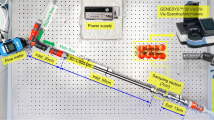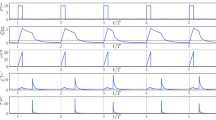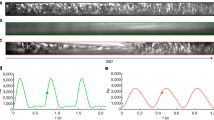Abstract
Traces of certain long-chain molecules added to fluids can greatly reduce turbulent friction on bodies moving through the fluid, or on surfaces past which it flows. Reductions of the friction by as much as 40 per cent can be achieved by as little as 10 parts per million by weight. The technique is already being used to reduce friction in the extraction of petroleum from oil wells. It may also make it possible to attain greater efficiency in pumping oil through pipes over long distances, in central-heating systems, and even in canals.
This is a preview of subscription content, access via your institution
Access options
Subscribe to this journal
Receive 51 print issues and online access
$199.00 per year
only $3.90 per issue
Buy this article
- Purchase on Springer Link
- Instant access to full article PDF
Prices may be subject to local taxes which are calculated during checkout
Similar content being viewed by others
References
Hoyt, J. W., and Fabula, A. G., paper presented at Fifth Symp. Naval Hydrodynamics, Bergen, Norway (1964).
Elata, C., and Poreh, M., Rheol. Acta, 5, 148 (1966).
Metzner, A. B., and Park, M. G., J. Fluid Mech., 20, 291 (1964).
Metzner, A. B., and Seyer, F. A., paper presented at Sixth Symp. Naval Hydrodynamics, Washington, D.C. (1966).
Savins, J. J., Soc. Petr. Eng. J., 4, 203 (1964).
Tennekes, H., Phys. Fluids, 9, 872 (1966).
Tulin, M. P., paper presented at Sixth Symp. Naval Hydrodynamics, Washington, D.C. (1966).
Gadd, G. E., Nature, 206, 463 (1965).
Goren, Y., thesis, Univ. Liverpool (1966).
Gadd, G. E., Nature, 211, 169 (1966).
Gadd, G. E., Nature (in the press).
Elata, C., Lehrer, J., and Kahanovitz, A., Israel J. Tech., 4, 87 (1966).
White, A., Hendon College of Technology, Res. Bull., No. 3 (Jan. 1966).
Ericksen, J. L., Trans. Soc. Rheol., 6, 275 (1962).
Tae-Sup, Lee, thesis, M.I.T. (1966).
Nash, T., J. Colloid Sci., 13, 134 (1958).
Shin, H., thesis, M.I.T. (1965).
Walsh, M., paper presented at Calif. Inst. Tech. and Naval Ordnance Test Station Physics of Fluids Conf., Pasadena, Calif. (1966).
Davies, G. A., and Ponter, A. B., Nature, 212, 66 (1966).
Elpyerin, I. T., and Smolskii, B. M., Vesti. Akad. Navuk Belarusk S.S.R Sev. Fiz-Tekhn, Navuk, 2, 39 (1965).
Goldstein, S., Modern Developments in Fluid Dynamics, 2, 676 (Oxford, 1938).
Oldroyd, J. G., Proc. First Intern. Congr. Rheol., Scheveningen (1949).
Barenblatt, G. I., et al., J. Prikl. Mech. Tech. Fiz., 5, 147 (1965).
Fabula, A. G., paper presented at Sixth Symp. Naval Hydrodynamics, Washington, D.C. (1966).
Author information
Authors and Affiliations
Rights and permissions
About this article
Cite this article
GADD, G. Reduction of Turbulent Friction in Liquids by Dissolved Additives. Nature 212, 874–877 (1966). https://doi.org/10.1038/212874a0
Issue Date:
DOI: https://doi.org/10.1038/212874a0
This article is cited by
-
Characterization of turbulent drag reduction in rotating disk system
Korean Journal of Chemical Engineering (1994)
-
A review on drag reduction with special reference to micellar systems
Colloid & Polymer Science (1984)
-
Electrochemical mass transfer in solutions containing drag-reducing polymers
Journal of Applied Electrochemistry (1977)
-
Electrochemical machining
Journal of Applied Electrochemistry (1977)
-
Recent developments in wood machining processes: Novel cutting techniques
Wood Science and Technology (1975)
Comments
By submitting a comment you agree to abide by our Terms and Community Guidelines. If you find something abusive or that does not comply with our terms or guidelines please flag it as inappropriate.



